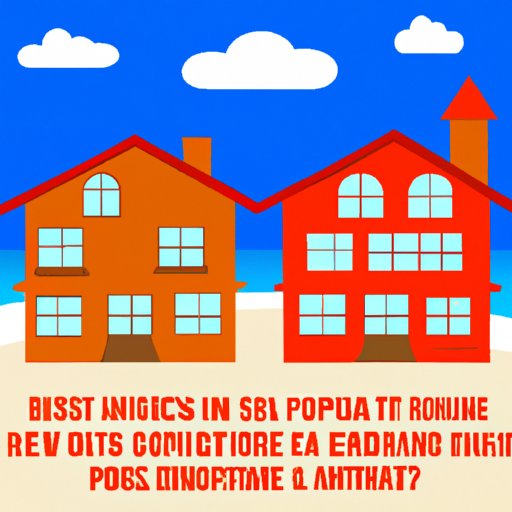Introduction
Vacation rentals are an increasingly popular form of accommodation for travelers. They offer more space than a hotel room and can often be cheaper than other rental options. But what about for investors? Are vacation rentals a good investment? This article will examine the pros and cons of investing in vacation rentals, as well as the tax implications and potential return on investment.
Analyzing the Pros and Cons of Vacation Rental Investments
When considering whether to invest in vacation rentals, it is important to weigh the potential benefits against the risks. Here we look at some of the key considerations for potential investors.
Financial Benefits of Vacation Rentals
One of the main attractions of investing in vacation rentals is the potential for a steady income stream. According to a survey by Vacasa, a vacation rental management company, “the median revenue for Vacasa-managed homes increased by 21 percent in 2018.” Vacation rentals also tend to be more profitable than long-term rentals, as they can command higher rates due to their flexibility and convenience. Additionally, investments in vacation rentals can appreciate in value over time, providing investors with a capital gain when they eventually sell the property.
Risks Involved in Investing in Vacation Rentals
While there are many potential benefits to investing in vacation rentals, there are also numerous risks that need to be taken into consideration. For starters, there is no guarantee that the property will be rented out consistently throughout the year. Vacation rental properties are subject to seasonality, and occupancy rates may vary depending on the time of year. Additionally, there is the risk that the property could suffer damage from renters, or that tenants may fail to pay rent. Finally, there are legal risks associated with vacation rentals, such as zoning regulations and health and safety requirements.

Examining the Impact of Vacation Rentals on Local Communities
The impact of vacation rentals on local communities is a contentious issue. Some argue that vacation rentals can provide an economic boost to struggling communities, while others claim that they can have a detrimental effect on quality of life.
Economic Effects
Proponents of vacation rentals argue that they can bring much-needed economic benefits to struggling communities. A recent study conducted by the National Bureau of Economic Research found that “Airbnb listings in certain areas can lead to economic growth, including increases in employment and wages.” The study concluded that “Airbnb has the potential to benefit local economies by creating new jobs and increasing spending in the area.”
Impact on Quality of Life
Critics of vacation rentals argue that they can have a negative impact on quality of life in local communities. A recent report published by the World Tourism Organization (WTO) found that “there is growing evidence that the proliferation of short-term rentals is leading to a decrease in affordable housing and an increase in rents, reducing the availability of long-term housing for local residents.” The report also highlighted concerns about noise and disturbances caused by tourists staying in vacation rentals.

Investigating the Tax Implications of Vacation Rentals
For investors, understanding the tax implications of vacation rentals is essential. Federal, state, and local taxes all need to be taken into consideration when calculating the potential return on investment.
Federal Taxes
In the US, any income earned from renting out a vacation rental property is considered taxable income. This means that investors must declare their rental income on their tax returns and pay any relevant taxes. Additionally, investors may be eligible for certain deductions, such as mortgage interest and property taxes.
State and Local Taxes
In addition to federal taxes, investors must also be aware of any state or local taxes that may be applicable. In some states, such as California, vacation rental owners are required to pay an additional “transient occupancy tax.” Investors should check with their local authorities to find out what taxes apply in their area.

Evaluating the Potential Return on Investment for Vacation Rentals
Once the potential tax implications have been taken into consideration, investors can then begin to calculate the potential return on investment for a vacation rental property. There are two main factors to consider: rental income and expenses.
Calculating Rental Income
The first step is to calculate the potential rental income. This can be done by estimating the number of days the property will be rented out each year and multiplying this by the average daily rate. It is also important to factor in any additional costs, such as cleaning fees or fees for amenities.
Calculating Expenses
The next step is to calculate the potential expenses associated with the property. These include ongoing costs such as mortgage payments, insurance, repairs and maintenance, and utilities. It is also important to factor in any one-off costs, such as marketing and advertising expenses, as well as any taxes that may be applicable.
Conclusion
Investing in vacation rentals can be a lucrative venture, but it is important to weigh up the potential benefits against the risks. Investors must consider the financial benefits and risks, as well as the tax implications and potential return on investment. Additionally, the impact of vacation rentals on local communities needs to be taken into account. With careful planning and research, investing in vacation rentals can be a profitable endeavor.
(Note: Is this article not meeting your expectations? Do you have knowledge or insights to share? Unlock new opportunities and expand your reach by joining our authors team. Click Registration to join us and share your expertise with our readers.)
